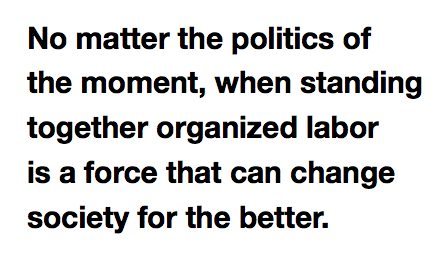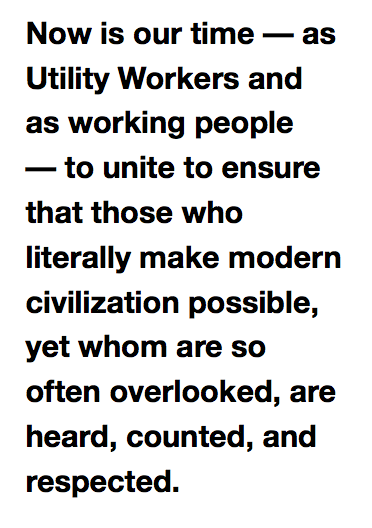VOTE! – Your Future Depends on It
Tuesday, November 6, 2018 — Mid-Term Elections
An ever-changing world
It has long been said that the only constant in life is change. In the case of American politics and how government affects the lives of working people, that has perhaps never been more true than right now.
As the country moves back and forth between governments controlled by both sides of the political aisle, change has been the result for many industries in which Utility Workers members are employed.
The ways in which energy generation is changing goes without saying – a seismic shift has been occurring due to market and government forces that have, and will continue, to alter the electric and natural gas sectors.
For water utilities, basic appropriations processes to fund much-needed infrastructure upgrades have become more difficult to achieve, leaving many systems in a growing state of disrepair.
More broadly, the rights of workers of all descriptions have come under increasing attack, making it harder than ever to freely organize, bargain, and demand dignity in the workplace. Nowhere has the effect of politics been plainer to see than in the recent U.S. Supreme Court decision, Janus v. AFSCME Council 31, effectively declaring the entire public sector a right-to-work zone.
Looking to the mid-term elections, when evaluating candidates, workers must ask themselves which of their candidate choices truly understands the issues that affect their lives, who will fight for their ability to make a decent living, in a safe workplace, and to receive the respect and dignity they deserve from their employers and their government.
Politics influencing our industries
 Perhaps no other sector has played such an outsized role in moving swing-state voters as the coal industry. Whether powerplant operators, railroad workers, miners, construction trades, or any of the thousands of towns and small businesses that depend on the industry for a livelihood, people want to know one thing — what is the future of King Coal?
Perhaps no other sector has played such an outsized role in moving swing-state voters as the coal industry. Whether powerplant operators, railroad workers, miners, construction trades, or any of the thousands of towns and small businesses that depend on the industry for a livelihood, people want to know one thing — what is the future of King Coal?
On one hand, there are politicians who will say they support the industry but seem to be unwilling or unable to stop the powerplants and mines from closing. On the other, there are those who say they want to assist communities affected by job loss and tax base erosion but, so far, little has come of such debate.
These workers and communities deserve better from their elected representatives and, this November, they must demand more — more respect for the industry’s role in having built the nation, and more respect for those who continue to make it possible to enjoy a lifestyle built on affordable energy.
For nuclear powerplant operators, this same conversation is moving into their industry as more facilities face closure. Entergy, which employs Utility Workers at facilities in Massachusetts, Michigan, and New York, will be closing all three. For some this may mean relocating to Entergy plants in the South or possibly retirement. For others, it could potentially mean several more years of work decommissioning these facilities but, whatever the outcome, one thing is clear — public policy choices have been, and will continue to be made that will affect how these transitions play out, and how workers and communities are affected.
Demand answers from candidates
It is incumbent upon us all to demand answers from candidates as to the choices they will make regarding this changing industry, and how they intend to assist those who are impacted by the change.
New energy industries are also continuing to emerge as both onshore and offshore wind turbines continue to be built around the country. Such facilities will be under construction up and down the East Coast for the next several decades and the Utility Workers have been asking elected officials to support our efforts to build out training programs that would lead people to a career in this new sector.
Political candidates must be asked whether they support union apprenticeship programs that prepare people for life-long, family-supporting careers that make a robust middle class possible, or whether they prefer an every-worker-for-themselves approach to seeking training and employment.
 For Utility Workers employed in the operation and maintenance of drinking and wastewater systems, the question for candidates could not be more clear — are they committed to the scale of public investment that’s truly necessary to bring all our nation’s systems up to date, to avoid a repeat of the Flint, Michigan disaster in cities around the country? A society that is not willing to invest in such fundamental, life-sustaining systems as water infrastructure is, by definition, unsustainable. No one is better positioned to deliver that message to politicians than the Utility Workers who do the work every day to make sure these systems work safely.
For Utility Workers employed in the operation and maintenance of drinking and wastewater systems, the question for candidates could not be more clear — are they committed to the scale of public investment that’s truly necessary to bring all our nation’s systems up to date, to avoid a repeat of the Flint, Michigan disaster in cities around the country? A society that is not willing to invest in such fundamental, life-sustaining systems as water infrastructure is, by definition, unsustainable. No one is better positioned to deliver that message to politicians than the Utility Workers who do the work every day to make sure these systems work safely.
Labor rights are human rights
In an 1861 address to Congress, President Abraham Lincoln set forth a philosophy of labor that holds true to this day – “Capital is only the fruit of labor and could never have existed if labor had not first existed. Labor is the superior of capital and deserves much the higher consideration.” In an address filled with the details of the beginning of the Civil War, Lincoln states, “…..nor is there any such thing as a free man being fixed for life in the condition of a hired laborer.”
Free men give their labor freely, and with dignity — an idea at the very center of the organized labor movement. To be forced into it, or to have the conditions of work forced upon a worker is not freedom. The right to stand up against these conditions, to have a fair say in the workplace, and not to be divided by the power of capital found expression this summer in the state of Missouri. Voters in the Show Me State overwhelmingly rejected a proposed right-to-work law, known on the ballot as “Proposition A.”
Sixty-seven percent of Missouri voters said “NO” to the proposition that capital should be allowed to divide the power of labor and weaken the voice of workers. No matter the politics of the moment, when standing together organized labor is a force that changes society for the better.
What we’re doing
As the elections on November 6th approach, the efforts of the UWUA are kicking into high gear. Mindful of all the issues discussed here, the National Union has rededicated itself to the fight at the heart of the labor movement for justice, equality, and dignity. As the original social justice movement, organized labor has a unique and indispensable role to play in driving politics to move in favor of working families.
As a part of the member-to-member program coordinated by the national AFL-CIO, many UWUA members have been released from their workplaces to take part in outreach to union members around the country, urging support for pro-worker candidates.
The idea is for union members to come together one-on-one, whether through phone calls, neighborhood walks, or just old-fashioned person-to-person discussions to share what’s happening in their workplaces and to talk about how election choices impact their daily lives.
Information on candidate voting records for incumbents, and issue stances from challengers will be distributed to locals and members up until election day. People will have the opportunity to have a look and decide for themselves who they think would advocate for them were they to be elected to office.
On election day, staff, members, and volunteers will take part in Get Out the Vote efforts around the country to help make sure everyone has a fair chance to make their voice heard at the ballot box. Whomever a citizen chooses to support, no one should be denied their right to vote simply because it’s challenging for them to make it to the polls.
Get involved!
Now is our time — as Utility Workers and as working people — to unite to ensure that those who literally make modern civilization possible, yet whom are so often overlooked, are heard, counted, and respected. The political system across the spectrum has, too often, operated at a distance from the concerns of working families and it’s up to trade unionists to hold them to account.
For those who are able, take whatever opportunity is available to get involved in the process this fall. Volunteer with your state AFL-CIO, or local Central Labor Council, many of whom will be coordinating phone banks, canvassing efforts, and Get Out the Vote work. Head out to campaign events, rallies, and town halls and ask candidates the tough questions — where do they stand on issues that affect workers and the utility industries? Will they fight for safety, respect, and dignity in the workplace, and for the right to organize and bargain as workers united in common cause?
Come November, the voices that will count will be those who are involved in the electoral process — be a part of determining what happens next!

